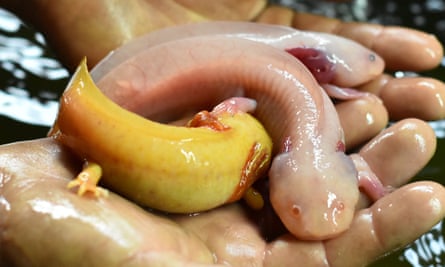On Friday, ecologists from Mexico’s National Autonomous University restarted a fundraising initiative to support the preservation of axolotls, an endangered species of fish-like salamander native to the region.
The campaign, called Adoptaxolotl, asks people for as little as 600 pesos (about $35) to virtually adopt one of the tiny “water monsters”. Virtual adoption comes with live updates on your axolotl’s health. For less money, donors can buy a virtual dinner for one of the creatures, which are relatively popular pets in the US.
According to the researchers leading the fundraiser, the population of Mexican axolotls in their primary habitat has decreased by 99.5% in less than 20 years.
The Adoptaxolotl campaign from last year collected over 450,000 pesos ($26,300) to support a captive-breeding program and the restoration of habitat in the historic Aztec canals of Xochimilco, located in the southern part of Mexico City.
However, according to Alejandro Calzada, an ecologist working for the government’s environment department, there are insufficient resources available for in-depth research on lesser-known species of axolotls.
Calzada, who oversees a team of nine researchers, stated that there is a significant lack in monitoring all of the streams in Mexico City, let alone the entire country. He added that the current monitoring efforts are inadequate for such a large area.

Despite the recent increase in popularity of the axolotl, nearly all 18 species found in Mexico are still considered critically endangered due to threats such as water pollution, a lethal amphibian fungus, and the presence of non-native rainbow trout.
According to the most recent census by the National Autonomous University, there has been a significant decline in the population of axolotls in Mexico. While scientists used to find an average of 6,000 axolotls per square kilometer, there are now only 36 remaining. A recent global study also reported that there are less than 1,000 Mexican axolotls left in their natural habitat.
Luis Zambrano González, a scientist from the university, stated that they are planning to conduct a new census in March. This will be the first census since 2014.
Zambrano stated that there is not enough time to visit Xochimilco. The pollution has taken over, with soccer fields and floating dens being heavily affected. He expressed sadness over the situation.
Without information on the quantity and geographical spread of diverse axolotl species in Mexico, it is difficult to determine the remaining time for these creatures and which areas should receive priority for available resources.
Calzada stated that it is imperative that we work quickly.
after newsletter promotion
Axolotls are now considered a cultural symbol in Mexico due to their distinctive, slippery appearance and remarkable ability to regenerate limbs. Researchers in various laboratories globally believe that this regenerative ability may hold the key to tissue repair and potentially even cancer healing.
Historically, government initiatives for preservation have primarily targeted the well-known Mexican axolotl species, which resides in Xochimilco. However, various other species can also be found throughout the country, ranging from small streams in the Mexico valley to the Sonora desert in the north.
The growth of Mexico City’s urban areas has negatively affected the water quality in the canals. In the lakes surrounding the city, rainbow trout from farms have been known to harm axolotls by competing for food and potentially displacing them.
According to Calzada, his team has observed a growing number of axolotls dying due to chytrid fungus, a disease that eats away at their skin and is causing widespread amphibian deaths from Europe to Australia.
Academics heavily depend on donations, while Calzada’s group relies on a group of volunteers. However, the Mexican government has recently implemented a funding decrease of 11% for its environmental department.
According to a study of Mexico’s 2024 budget, the current government, under President Andrés Manuel López Obrador, will have allocated 35% less funds to the country’s environment department over a period of six years compared to the previous administration.
Source: theguardian.com
















